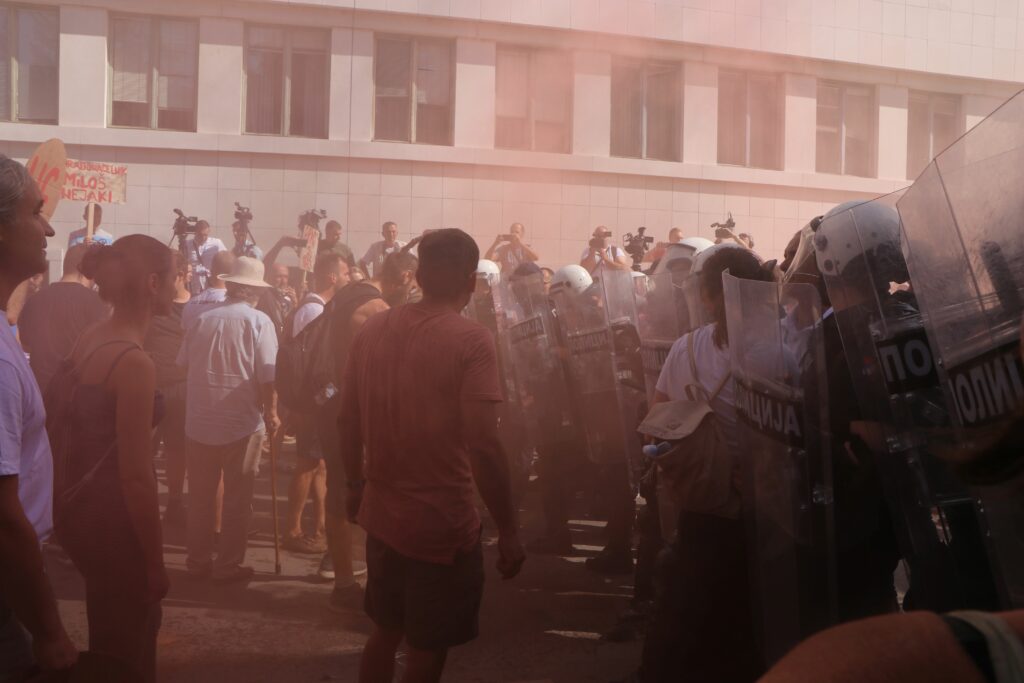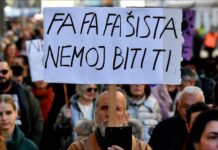
IF THEY WERE “SOMEONE” IN SERBIA: SYSTEMIC CHANGE
If young people were “someone” in the country, they would first of all work on affecting systemic change in Serbia, starting with ensuring state institutions do their job, that the law is respected, and citizens are listened to.
The fact is that young people are not sufficiently involved in decision-making, and the state is failing to establish a quality strategy for young people. However, as we saw at the numerous protests that marked the previous year, it was the young that were on the front lines of defense.
Activists came together and organized mass roadblocks in Belgrade and elsewhere with the aim of shutting down lithium mining by the Rio Tinto company. In Novi Sad activists continue their fight against the adoption of the city’s General Urban Plan (GUP), which would be in force until 2030, but against which the most objections in the history of spatial planning in Serbia have been submitted – almost 13,000 negative remarks, the majority of which have been dismissed. The tabloid Informer published an interview with a serial rapist, and women in Serbia united and organized a series of protests that managed to draw attention to the unfavorable status of women in Serbia, but also the inaction of institutions.
“Women’s Revolution”
Jelena Riznić, an activist with the organization “Women’s Solidarity”, went public with her experience of male violence and the lack of response from institutions. According to her, the man she reported for stalking in 2019 wrote on the Instagram profile of Serbian President Aleksandar Vucic in August last year that he wanted to kill her and that he had acquired a gun – the man was detained, the gun confiscated, but he was soon released from prison.
“If the next time the initials in a femicide case are mine, my question is will the public still say it’s a tragedy? Because I know it won’t be. It’s going to be a murder that could have been prevented, many times. And there would also be other culprits, not just my stalker – the institutions that have not listened to me. The same institutions that killed a two-year-old girl and more than twenty women last year and in all the previous years,” she wrote in an open letter.
Riznic told Perspektiva that the major problem is that in institutions, when women turn to them, a large part of the decisions are based on the individual assessment of the people in that system, on their individual beliefs, values and views.
“Women’s safety must be above those individual views, beliefs and the like. It is necessary for some control mechanisms to be in place to oversee the implementation of laws, which are often very good, in these institutions,” Riznic says.
She also explains that this sends a message to young girls and women to stay quiet, and there are many examples where women actually remain silent and do not talk about their problems. But, young girls and women should not back down on such matters, they need to be braver and bolder than the system.
“We see the ease with which lawsuits are being brought up against activists, at a speed that no woman has experienced when she seeks justice. We should rebel against such a system, and if it sometimes means that we are breaking some laws, then we should do that since laws very often exist to keep us in a situation where nothing can really change. On the other hand, I think that in recent years some things have changed, and that’s because women are pushing boundaries and making tectonic changes to the system.”
“Stepping on the line” leads to institutional harassment
Activists Brajan Brkovic has been involved in numerous activist initiatives in Novi Sad for years, and he has been targeted online and offline, even being called out in the National Assembly of the Republic of Serbia by an MP from the Serbian Progressive Party (SNS) who spoke about his grandfather.
Since last year’s protests, he has accumulated five criminal and four misdemeanor charges, while on the other hand, no action has been taken on the complaints he filed against unknown persons who threatened him.
“Here, when you are not characterized as someone who is ‘theirs’, the institutions ignore you. So much disregard at a point turns into institutional violence,” Brkovic said.
Young people, he says, need to travel more because it will broaden their horizons, and that would reduce the level of polarization in society, and after the SNS leaves power, it will take a certain period of time until there is a change in people’s way of thinking, and this is precisely in what young people are investing their hope.
“For the new generations of youth, the primary way of communication is through social platforms, which also provide some other form of information and allows for some chance to rise above a certain context and see that life can be somewhat different and gives you the opportunity to explore,” he explains.
Environmental issues for young people have still not been “tainted” by politics
Young people in Serbia are mostly dissociating themselves from politics, but they have also proven to be active in environmental protests against Rio Tinto. Ivan Bjelić, a journalist and activist of the “March on the Drina” movement, agrees with this, saying that he noticed a surprisingly large number of young people at the blockades.
He explains that boosting nationalism, especially among young people, is never a good sign, but it is essential to distinguish how many of them there actually is from how loud they are.
“Young people should pay more attention to who they are, where they are, how the government sees them and how they can get their position to be raised to a higher level. A stop should be put to divisions, and young people should not see politics as something bad and dirty. It’s not, it’s just the people involved who are, and young people should realize that politics is replaceable and that we are the ones who influence that,” he adds.
If they were someone…
We asked the interlocutors of Perspektiva what would be the first thing they would change in their country or what they would start with if they were “someone”.
Brkovic says he would first focus on respecting and applying the law – to everyone.
“All those people who went unpunished thirty years ago have always served as an encouraging example that has led to the fact that we perceive corruption as insignificant, so for example everyone will try to ride the bus without a ticket. The rule of law and law are the basis of every state and they are the only way to get to the point where state institutions and civil servants and politicians are perceived as a service to citizens, and not as a pipe through which money passes,” he points out.
Riznic says she would change the way institutions and society at-large respond to women.
“I would definitely change the atmosphere where women can’t complain. I would like new generations of girls to grow up in such an atmosphere and to know that not only they can but that they have to rebel, cross limits and fight for themselves and for other women,” she says.
Bjelic says it’s hard to decide on one thing that is necessary, but if he had to choose, he would start with the law and the protection of water resources in Serbia. “The problem is that water is now becoming private property and it is being sold, exploited, destroyed, devastated and these are some things that I would pay attention to first – the Water Law and the use of water resources,” he explains.
by Aleksandra Reves












